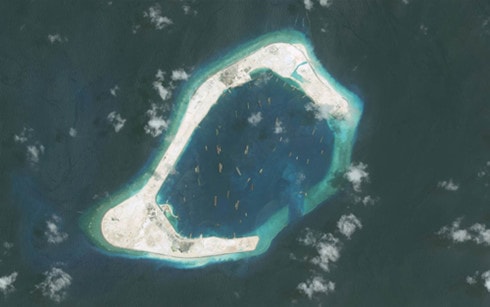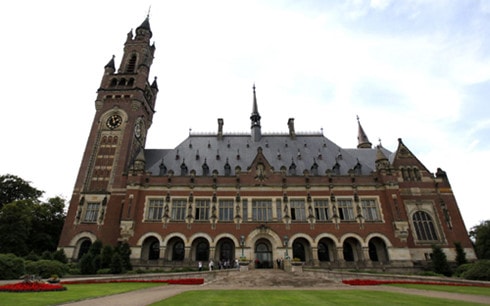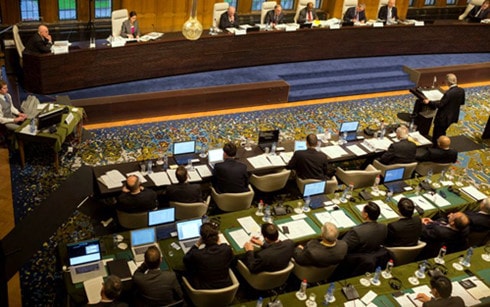Exposing China's plot to deal with PCA
China claims to be indifferent to the PCA ruling but is actually launching a campaign to counter the Philippines' lawsuit.
It is an undeniable fact that the Chinese leadership has always shown an attitude of not appreciating, if not “disdainful” towards, the Permanent Court of Arbitration (PCA) in The Hague, Netherlands. According to observers, the PCA’s ruling on July 12 will likely bring many disadvantages to China.
 |
| China's illegally built artificial island on Subi Reef in the East Sea. (Photo: Getty) |
Massive propaganda campaign…
Of course, anticipating this possibility, China has come up with various ways to try to undermine the PCA's reputation as well as the legality of the upcoming ruling.
Last week, Chinese state media carried articles describing the PCA as an “abusive tribunal” whose “jurisdiction is widely disputed,” while senior Beijing diplomats said the tribunal failed to ensure fairness.
China has even taken its propaganda campaign on the South China Sea to Washington. On July 5, Dai Bingguo, a former member of China’s State Council, spoke at a conference held at the Carnegie Endowment for International Peace in Washington.
Here, Mr. Dai Bingguo brazenly stated that the PCA's ruling would be no different from "a piece of waste paper that should be thrown in the trash", while repeating the familiar argument of the Chinese authorities that no one and no country need to comply with the PCA's ruling in any form and that the PCA has no jurisdiction over this case.
“China sees itself as a world power and can do whatever it wants,” said Anders Corr of Corr Analytics. “Beijing reacts strongly against any country or organization, whether it is the United Nations or an international court, because it fears being touched in what it considers its backyard.”
 |
| View outside the Permanent Court of Arbitration in The Hague, Netherlands. (Photo: Quazt) |
Sonya Sceats, an international law expert at Chatham House, said Beijing was angry about the Philippines' lawsuit because it was on the weaker side. However, Ms. Sceats also noted that behind the indifference, China is quietly hiring international lawyers to provide legal support for disputes in the region.
At the national level, China is also constantly imbued with the feeling that it is the victim in the lawsuit. Recently, an editorial published in theGlobal Timesbelieves that the Philippines' lawsuit was directed by the US.
The newspaper also accused the PCA of deliberately pretending not to know the Philippines' real motive for filing the lawsuit, which was to use the court's hand to claim territory, and this was a trap to discredit China.
…But the argument is loose.
China has also tried to discredit the tribunal by arguing that the person who appointed the panel of judges is a Japanese citizen and therefore will be biased because Tokyo is currently involved in a dispute with Beijing in the East China Sea.
However, this loose argument of China has also been rejected by analysts. Remember, after the Philippines filed the lawsuit in January 2013, a panel of judges was established to hear the case.
 |
| A working session of the Permanent Court of Arbitration. (Photo: PCA) |
By law, in the five-member panel of judges, each party in the case has the right to choose two judges, while the president of the International Tribunal for the Law of the Sea (ITLOS) chooses the fifth.
However, China stubbornly refused to participate in the case, denying itself the right to choose the judge, forcing the then president of ITLOS, Mr. Shunji Yanai, a Japanese citizen, to choose the judge on China's behalf according to standard procedures (Mr. Shunji Yanai did not directly participate in the case).
“It is not an issue that needs to be seriously debated,” said James Kraska, professor of international law and director of research at the Stockton Center for Legal Studies at the US Naval War College.
“This argument is similar to what Donald Trump said about Mexican-American judges,” Kraska said, referring to the Republican presidential candidate’s claim that Mexican-American judges could not be trusted to rule on the lawsuit over the closure of Trump University.
Since 1997, ITLOS has heard 25 cases, but according to Kraska, this is the first time the nationality of a judge involved has been brought into question regarding his impartiality.
“None of these judges have had any clear political leanings throughout their careers. They are legal professionals who have dedicated their lives to fighting for the rule of law in the maritime domain. They are dedicated people who truly believe in the value of international law and the law of the sea,” Mr. Kraska said./.
According to VOV
| RELATED NEWS |
|---|


